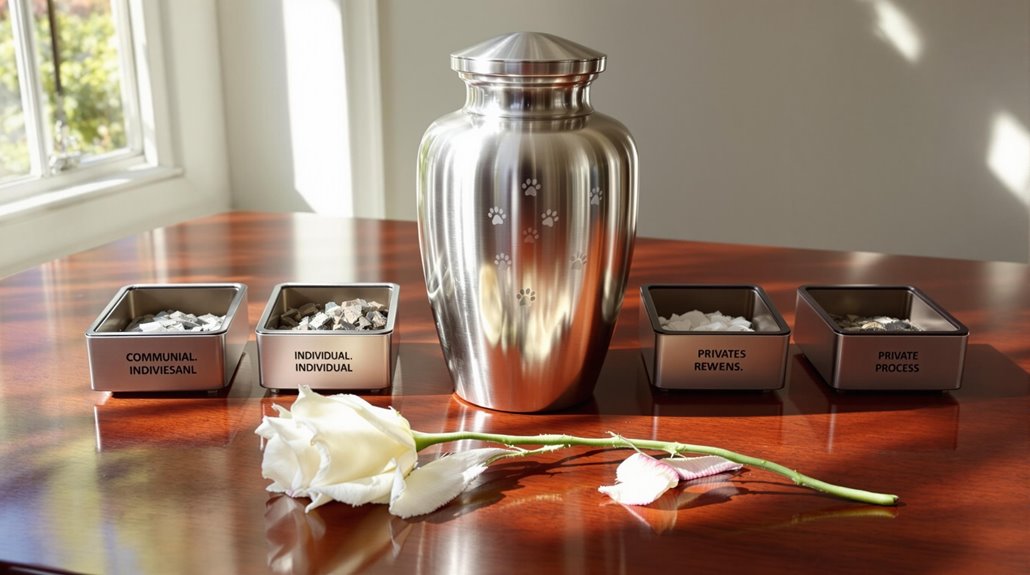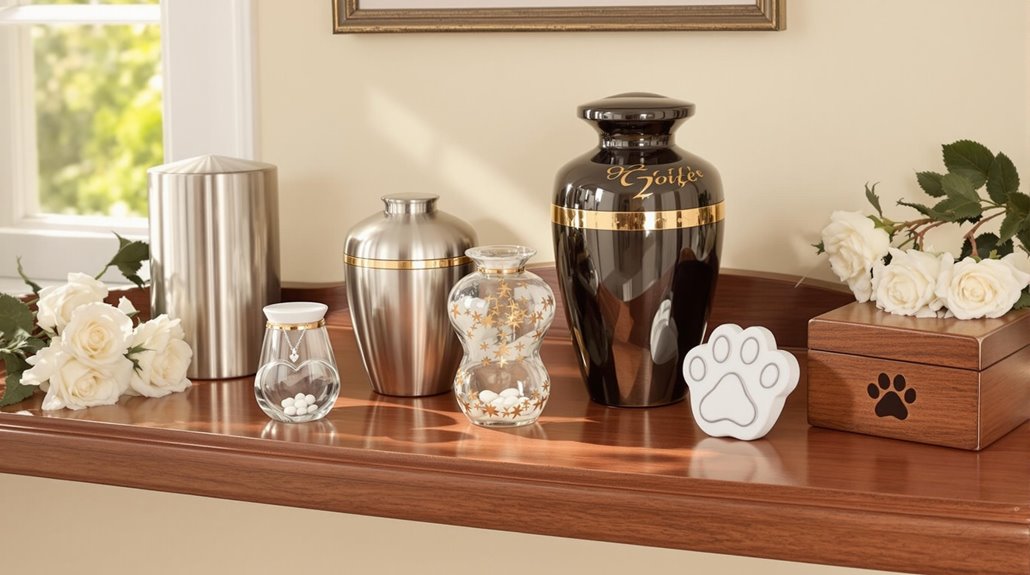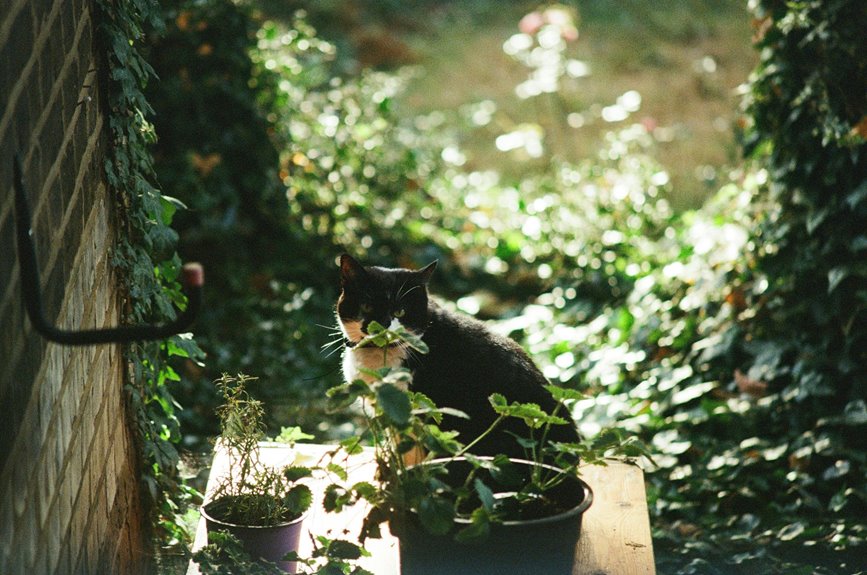Pet cremation services aren’t created equal, with options ranging from private cremation ($200-350) to communal cremation ($50). You’ll need to verify tracking systems and facility certifications to guarantee your pet’s remains aren’t mixed with others. Hidden fees include transportation ($25-75), urns ($30-200), and handling charges, while premium packages can mark up costs by 300%. Understanding these industry practices will help protect both your pet’s dignity and your wallet.
Types of Pet Cremation Services Explained

When facing the loss of a beloved pet, you’ll encounter three distinct cremation options that greatly impact both closure and cost.
Private cremation guarantees your pet is cremated alone, providing you with only their ashes – but you’ll pay premium prices for this assurance.
Partitioned cremation separates pets with dividers during the process, offering a lower-cost middle ground that still returns primarily your pet’s remains.
Communal cremation, the industry’s mass-processing option, places multiple pets together with no separation of ashes.
Your choice should align with your individual preferences and cultural practices, but providers don’t always explain these significant differences upfront.
While facilities advertise “individual cremation,” this often means partitioned rather than truly private services – a distinction that affects both pricing and what you’ll receive.
Understanding the Pet Cremation Process
Before choosing a pet cremation service, you’ll need to understand the key differences between private, partitioned, and communal options, each offering varying levels of individual care and cost considerations.
The actual cremation process follows strict protocols, where temperatures reach 1,400-1,800 degrees Fahrenheit, converting your pet’s remains into fine ash through careful monitoring and specialized equipment.
Your pet’s ashes are then meticulously processed, removing any non-organic materials, and carefully packaged in your chosen urn or container, with documentation verifying the entire procedure.
Types of Cremation Services
Pet cremation services generally fall into three distinct categories, each offering different levels of privacy and memorial options for your beloved companion. Your individual preferences and cultural considerations will guide which type best honors your pet’s memory.
| Service Type | Key Features |
|---|---|
| Private | One pet only, ashes returned |
| Partitioned | Multiple pets, separated chambers |
| Communal | Multiple pets, shared ashes |
| Semi-Private | 2-3 pets, mixed ashes |
| Witnessed | Family can observe process |
You’ll find that private cremation, while costlier, guarantees you receive only your pet’s ashes. Partitioned services maintain separation but share equipment space. Communal options, the most affordable choice, mean your pet’s ashes combine with others – a fact many providers don’t readily disclose. The witnessed option lets you verify the process personally, though it’s not for everyone.
Step-by-Step Cremation Procedure
Understanding how crematoriums process your companion requires examining a carefully orchestrated sequence of technical steps.
Upon arrival, your pet’s body receives an ID tag that follows them through the entire cremation timeline. Staff then carefully transfer them to a temperature-controlled holding area until processing begins.
The actual cremation occurs in a specialized chamber heated to 1,400-1,800°F. Your pet’s remains are placed inside for 2-3 hours, depending on size. During this phase, organic matter transforms into bone fragments and ash.
Afterward, technicians remove any metal items like surgical pins or microchips before handling remains. The fragments undergo a final processing step in a specialized machine that creates the uniform, fine ash you’ll receive.
Staff then transfer these ashes to your chosen urn or container, completing the documented chain of custody.
Costs and Pricing for Pet Cremation
The average cost of cremating a beloved companion ranges from $50 to $350 nationwide, though premium services can escalate well beyond $1,000. You’ll find affordable options at local veterinary clinics, but they often lack the personalized care of dedicated pet crematoriums.
A typical price breakdown reveals hidden fees – transportation ($25-75), urns ($30-200), and “handling charges” that mysteriously appear on final bills.
What’s particularly concerning is the industry’s tiered pricing structure. Basic communal cremation starts at $50, while private cremation commands $200-350. The markup on “premium packages” can reach 300%, with facilities charging extra for viewing rooms, paw prints, and ceremonial services.
You’re paying for dignity, they say – but the question remains: Should a final goodbye cost more than a month’s groceries?
Choosing a Reputable Pet Cremation Provider
When selecting a pet cremation provider, you’ll face an industry where regulation gaps allow questionable operators to flourish alongside legitimate businesses. Your first step should be a thorough reputation assessment, checking Better Business Bureau ratings, online reviews, and veterinary recommendations.
Don’t settle for the first or cheapest option you find. Conduct a detailed service comparison between at least three providers. Ask pointed questions about their tracking systems, facility certifications, and witnessing options.
Request proof of individual cremation procedures if that’s your preference. Be wary of providers who seem evasive about their processes or can’t show you their facilities. Your pet deserves a dignified farewell, and reputable crematoriums will welcome your scrutiny.
Look for businesses that provide clear documentation and maintain transparent communication throughout the process.
Memorial Options and Keepsakes

Selecting meaningful memorial items transforms raw grief into tangible remembrance after your pet’s cremation.
Today’s market offers diverse options, from personalized urns crafted in hand-blown glass to memorial jewelry containing small portions of ashes. You’ll find providers charging $50 to $500 for basic commemorative items, while custom pieces can exceed $2,000.
Be wary of mass-produced “unique” keepsakes that aren’t actually unique. Many retailers source identical products from overseas manufacturers, simply adding engraving at marked-up prices.
Instead, seek authentic artisans who specialize in pet memorials. Quality craftspeople will provide material certificates, detailed creation processes, and portfolio examples. They’ll also respect your budget without pushing unnecessary add-ons.
Your pet’s memory deserves more than generic, assembly-line trinkets marketed as “exclusive.”
Making Arrangements in Advance
Although discussing end-of-life arrangements feels uncomfortable, pre-planning your pet’s cremation spares you from rushed decisions during emotional turmoil.
Pre-planning benefits include locking in current prices, selecting preferred services, and arranging payment plans that won’t strain your budget later.
Making advance arrangements lets you carefully compare facilities, review their operating standards, and verify licensing credentials.
You’ll have time to tour locations, ask detailed questions about their processes, and secure written documentation of your chosen services.
This methodical approach strengthens your emotional preparedness while ensuring transparency.
Your advance planning also allows you to designate an authorized representative, establish clear instructions for remains handling, and choose memorial items without time pressure.
These decisions, made thoughtfully now, prevent potential complications when you’re grieving.
What to Expect When the Time Comes
The final moments with your pet deserve full mental and emotional preparation, even with advance arrangements in place.
You’ll need to coordinate transportation to the crematory, complete necessary paperwork, and make final decisions about individual versus communal cremation. Having emotional support during this process is essential.
The facility staff will guide you through the identification process, which typically involves photographing your pet and applying a numbered tag.
You’ll have the option to spend private time saying goodbye in a designated comfort room. Many facilities now offer pet grief counseling referrals or support groups.
The actual cremation usually takes 2-3 hours for small pets, longer for larger ones.
You’ll receive detailed instructions for picking up your pet’s ashes, typically within 48 hours.
Conclusion
When you’re ready to say goodbye, remember that your pet’s final journey deserves careful consideration. Like a fading sunset, their physical presence transforms but their spirit endures. You’ll need to weigh the options, costs, and providers with both head and heart. Don’t wait until grief clouds your judgment – research and plan ahead. Your companion’s legacy can shine through meaningful memorials that honor their pawprints on your life.





